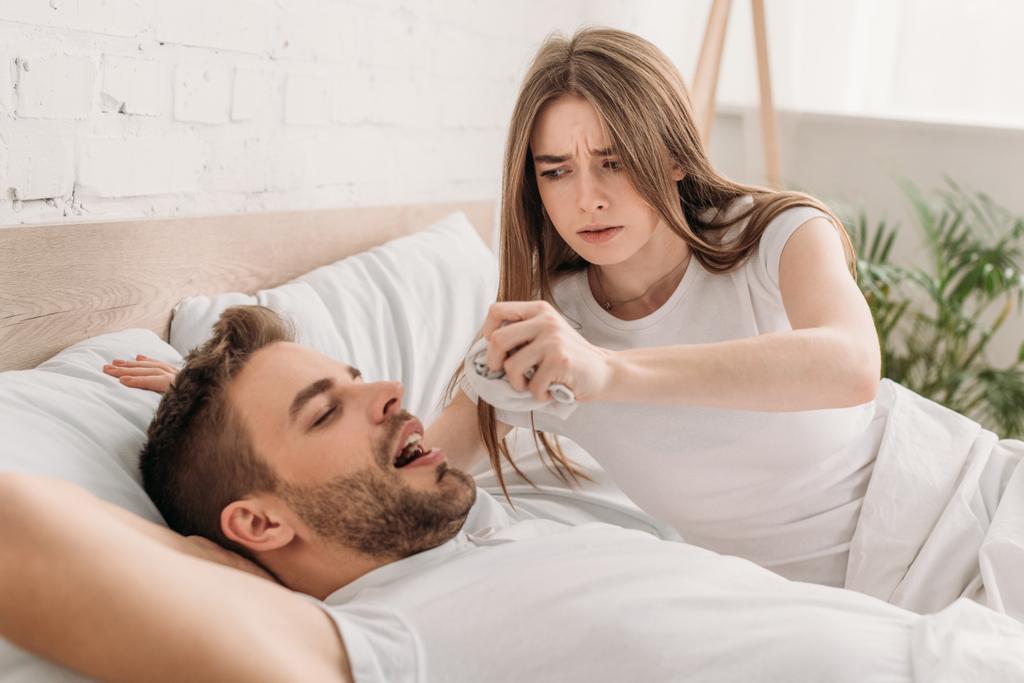6 Natural Solutions to End Snoring at Night

Snoring is a common irritation for many people, affecting people’s quality of sleep each night.
An estimated 45% of adults snore occasionally, while 25% snore regularly—often disturbing their bed partner's slumber and possibly their own, too, according to Johns Hopkins Medicine facility from the Johns Hopkins University School of Medicine.
Snoring is caused when air can’t move freely through the nose and throat during sleep. This causes the surrounding tissues to vibrate, creating snoring noise. Generally, people who snore have too much throat and tongue tissue that interferes with smooth breathing.
Fortunately, there are effective natural remedies for stopping snoring that you can try, many of which are simple and inexpensive.
Some snoring cures include sleeping on your side, using a steam bowl, and strengthening your tongue and throat muscles. These can all help to reduce snoring and allow you to sleep peacefully.
Let’s examine in a bit more detail some of the most effective ways to stop snoring at night.
Best Cures to Stop Snoring

Here are some effective, natural snoring remedies you can try before seeking medical attention:
1. Quit Smoking
If you have been struggling with snoring for a long time, you may want to consider quitting smoking. Smoking affects the airways and causes breathing problems. This habit can affect the airways, resulting in drowsiness and nasal congestion.
Smoking also contributes to inflammation and narrowing of airways. Smokers should quit immediately to see a difference in their snoring. Quitting will significantly improve the quality of your sleep, as well as your overall health.
Once you stop smoking, you’ll be able to enjoy peaceful sleep without snoring. Quit smoking today and enjoy a healthier night’s sleep.
If the snoring is triggered by physical problems, such as nasal congestion, your doctor may prescribe a snoring treatmentlike steroid sprays. In severe cases, surgery may be necessary.
Sedatives and alcohol can also cause snoring because they depress the central nervous system and cause the throat muscles to relax too much. Quitting these is also helpful to stop snoring.
2. Loose Excess Weight
Weight loss is another way to prevent snoring. Excess weight can cause snoring because it puts pressure on the neck while you’re sleeping.
Losing weight can be what helps with snoring, and it’s also a great motivation for healthy lifestyle changes. The best way to lose weight is to eat a calorie-controlled diet.
Even though losing weight isn’t the easiest option, it can be the best solution to end your snoring problem.
3. Sleep on Your Side
One of the most common snoring causes is sleeping on your back. This can clog your airway and cause you to snore. The airway is also constricted by your tongue and chin, which can lead to a loud snoring sound.
If you’re suffering and want to know how to stop snoring at night, try sleeping on your side instead of your back. Sleeping on your back narrows the airways, causing you to snore while sleeping on your side opens them up. Thus, sleeping on your side can reduce the amount of snoring and improve the quality of your sleep and your relationship with your partner.
Proper pillow positioning can also help to avoid snoring, as can elevating your head. Many people snore due to wrong sleeping positions. Sleeping on your back narrows your airways and makes it difficult to breathe. This can also cause a condition known as sleep apnea, which is a severe health issue.
It’s essential, therefore, to try to sleep on your side when you can. But, if you’re not sure how to adjust, try using a body pillow to help you stay on your side and help you breathe properly.
A wedge pillow is another tool that can help you sleep on your side. It helps elevate the head, so you don’t put weight on your back and snore.
Another good snoring treatment is a pillow made of memory foam. It has adjustable height and aligns the airway, making it easier to sleep on your side. Some pillows also feature ergonomic ridges and armholes to promote side sleeping.
4. Clear Your Nasal Congestion
Many people snore because of a blocked nose. People with allergies or asthma tend to snore more than those without them. To help open up the air passages, use essential oils such as eucalyptus or marjoram.
Steaming can also help open up your nose and airways. The steam can be scalding, so use caution when using it. A steam bowl should be used carefully, as the fumes could burn you. If you suffer from severe sinusitis, it’s best to consult your doctor before trying this method.
Another natural snoring cure involves drinking a turmeric-and-milk mixture before bed. Turmeric is an excellent antiseptic and can help boost your immune system. Drink this mixture about 30 minutes before bedtime to help clear up your airways and reduce nasal inflammation.
5. Strengthen Your Tongue and Throat Muscles
There are many ways to strengthen the muscles in your throat and tongue. Depending on the severity of your snoring, lifestyle changes may be necessary. For instance, you may need to quit smoking or drinking alcohol to strengthen the muscles in your throat.
Another way to strengthen the muscles in your throat and end snoring is to use a mandibular advancement device. The device allows you to work out your throat and tongue muscles. You can find many models on the market and compare their technical approaches. These exercises may be painful or uncomfortable initially, but they are very effective and help to stop snoring.
You may also want to practice vocal exercises, such as singing or enunciation. These exercises can help tone your tongue and throat muscles, reducing the number of vibrations that cause you to snore. Practicing these exercises every day can help you reduce snoring by improving the condition of your tongue and throat muscles, which are the primary causes of snoring.
Other activities that can help you tone these muscles include swimming, biking, and playing outdoor games. Regular exercise improves overall health and well-being, which is essential for snoring treatment and prevention. The activities can help reduce the noise you make by toning your tongue and throat muscles. They can also reduce the floppiness of the throat and pharynx.
Another option to avoid snoring is to use Myofunctional therapy, which involves the practice of exercises in your mouth. The exercises improve the position of your tongue and throat, promoting breathing through the nose. Myofunctional therapy and oropharyngeal exercises are often taught by a Myofunctional therapist and can reduce snoring and sleep apnea episodes.
6. Use Oral Appliance for Snoring
An oral appliance for snoring is comfortable and looks natural in the mouth. It is a thin, flexible material that fits in the mouth without protruding out.
Such devices aim to stop snoring by reducing snoring noises. They come with a wide range of features that can effectively address your specific snoring problem. Because these are custom-fit devices, they are more effective when worn. Some of the devices offer several levels of snoring relief, enabling you to set a level of comfort for yourself or your partner.
Other oral appliances for snoring relief come with mouthpieces for upper and lower snoring prevention. Each mouthpiece is custom-fitted to fit your bite. This system also enables you to customize your mouthguard to fit any size for maximum comfort. It has a tori, which guides your tongue down and forward, allowing you to breathe easier.
However, while many mouthpiece guards are readily available on the market, not all of them are the best solution for snoring problems. Mouthpiece guards that move your jaw forward to open the airway can cause TMJ problems. So, if you suffer from a misaligned bite, it can cause severe pain.
Moreover, some oral appliances designed for mouth breathing may not be appropriate for people with dentures or dental braces as their matrix design makes it hard to clean and requires more frequent replacement. In addition, these devices can cause jaw pain in the early stages. Therefore, it is essential to consider what’s the best option for you before purchasing it.
In Conclusion
Try and record your sleeping habits. Keep a sleep diary to record your sleeping habits. Your partner can help you fill in the log. If you sleep alone, you can also keep a diary for yourself.
When you record your sleep, you’ll be able to better pinpoint what is causing your snores so you take appropriate measures to stop snoring, including the remedies listed above and visiting a qualified medical practitioner for additional help if needed.




















